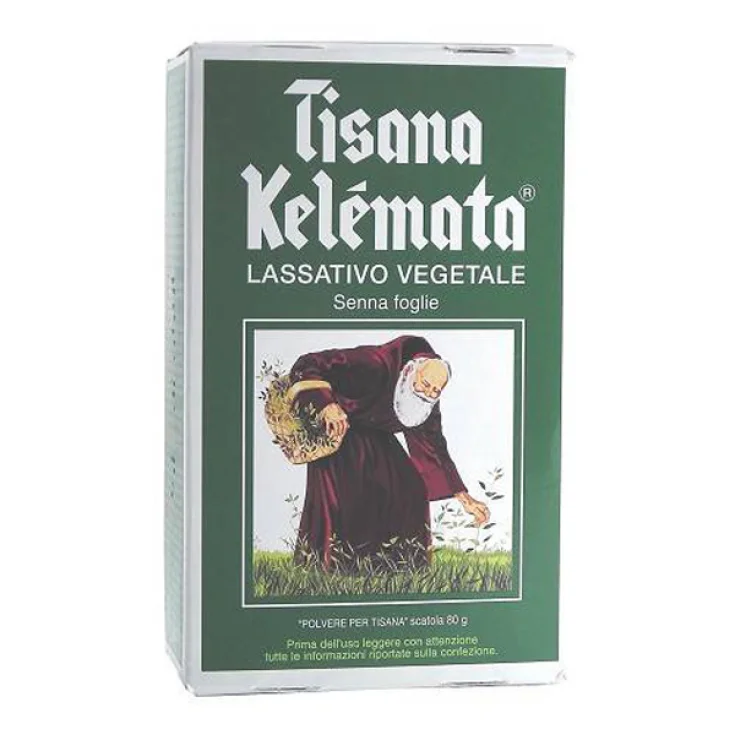Kelémata Herbal Tea Treatment Occasional Constipation 80g

- Brand: KELEMATA Srl
- Product Code: 000367058
- EAN:
- Availability: In Stock (evaso in 24 ore)
- 3 items
for 8,00€ each - 4 items
for 7,83€ each - 5 items
for 7,67€ each
Kelémata Herbal Tea Kelemata Herbs Oral Solution
What is Kelemata for
Kelemata is a useful herbal tea for the treatment of Occasional Constipation.
Active principles
100 g contain: Active ingredient: Senna leaves g 51.28 Flavorings and excipients: Gramigna rhizome g 12.83 Wood guaiac g 6.41 Hyssop leaves g 6.41 Parietaria leaves g 6.41 Peppermint leaves g 5.13 Sarsaparilla roots g 6.41 Star anise fruits g 2.56 Lemon balm top g 2.56
Excipients
Gramigna, guaiac, hyssop, parietaria, peppermint, sarsaparilla, star anise and lemon balm.
Therapeutic indications
Short-term treatment of occasional constipation.
Contraindications
Hypersensitivity to the active substance or to any of the excipients. Laxatives are contraindicated in subjects with acute abdominal pain or of unknown origin, nausea or vomiting, intestinal obstruction or stenosis, rectal bleeding of unknown origin, severe dehydration. Generally contraindicated during pregnancy and lactation (see p. 4.6). Contraindicated in children under 10 years of age.
Dosage
The correct dose is the minimum sufficient to produce easy evacuation of soft stools. It is advisable to initially use the minimum doses provided. When necessary, the dose can be increased, but never exceed the maximum indicated. Take preferably in the evening. Laxatives should be used as infrequently as possible and for no more than seven days. Use for longer periods of time requires a doctor's prescription after adequate evaluation of the individual case. Swallow with an adequate amount of water. A diet rich in liquids favors the effect of the medicine. Take the herbal tea prepared as follows: put 1-2 teaspoons of Kelemata herbal tea in a teacup; pour over boiling water and leave to infuse for 10-15 minutes, then strain. Do not exceed the recommended dose.
Warnings and Precautions
Warnings. The abuse of laxatives (frequent or prolonged use or with excessive doses) can cause persistent diarrhea with consequent loss of water, mineral salts (especially potassium) and other essential nutritional factors. In the most severe cases, dehydration or hypokalaemia may develop, which can lead to cardiac or neuromuscular dysfunctions, especially in the case of simultaneous treatment with cardiac glycosides, diuretics or corticosteroids. The abuse of laxatives, especially contact laxatives (stimulant laxatives) can cause addiction (and, therefore, the possible need to gradually increase the dosage), chronic constipation and loss of normal intestinal functions (intestinal atony). Precautions for use. In children under the age of 12, the medicine can only be used after consulting your doctor. The treatment of chronic or recurrent constipation always requires the intervention of the doctor for the diagnosis, the prescription of drugs and the surveillance during the course of therapy. Consult your doctor when the need for the laxative derives from a sudden change in previous bowel habits (frequency and characteristics of bowel movements) lasting more than two weeks or when the use of the laxative fails to produce effects. It is also advisable that elderly people or those in poor health conditions consult their doctor before using the medicine.
Interactions
Laxatives can reduce the time spent in the intestine, and therefore, the absorption, of other drugs administered simultaneously orally. Therefore, avoid ingesting laxatives and other drugs at the same time: after taking a medicine, leave an interval of at least two hours before taking the laxative. Milk or antacids can change the effect of the medicine; allow an interval of at least one hour to elapse before taking the laxative.
Side effects
Occasionally: isolated cramping pains or abdominal colic, more frequent in cases of severe constipation. With the use of the product, the urine sometimes turns slightly yellow-brown or red. This coloration is simply due to the presence of senna components in the urine and is not clinically significant.
Pregnancy and breastfeeding
There are no adequate and well-controlled studies on the use of the drug in pregnancy or breastfeeding. Therefore, the medicine should only be used in case of need, under the direct supervision of the doctor, after evaluating the expected benefit to the mother in relation to the possible risk to the fetus or infant.
Format
Kelemata Tisana is sold in packs of 80g.






